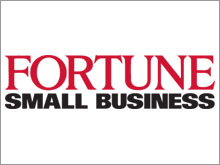 |
| Customer surveys on the cheap
|
| Thanks to several online services, small business owners can learn what consumers really want. (Full story)
|
|
|
|
|
|
NEW YORK (FORTUNE Small Business) -
The blogosphere is a vast, unruly, and totally tantalizing mother lode of unvarnished consumer opinion on every product and service in the capitalist universe. But to know what the masses are saying about your product, you would have to dig through 350,000 daily postings on a staggering 20 million blogs worldwide.
Enter Umbria, a market research firm in Boulder that designs software to find useful consumer intelligence on the Internet. "The blogosphere is overflowing with brutally honest opinion," says Howard Kaushansky, Umbria's 47-year-old CEO. "Our goal is to track those opinions down."
Every few hours Umbria sends an application called a spider out over the web to scour the blogosphere for postings about the firm's clients, most of which are big consumer companies, such as Electronic Arts, SAP and Sprint. By analyzing keywords in blogs on behalf of Sprint, for example, Umbria's software can tell whether a blogger is talking about customer service, the company's advertisements, or a particular calling plan.
To figure out whether an opinion is strong or tepid, the applications knows that "awesome" is a stronger endorsement than "pretty cool," and that "shoddy" is less damning than "abominable," thanks to several employees with Ph.D.s in linguistics and artificial intelligence.
Kaushansky claims his software can even identify sarcasm, a useful skill in the prickly blogosphere. It can also estimate the author's age and gender. Elongated spellings ("soooooooo"), multiple exclamation marks (!!!) suggest a teenage female. The blogger is probably a teenage boy if a posting is rife with hip-hop terminology such as "aight" (translation: "all right") and "true dat" ("I agree!").
The twenty- and thirty-somethings are more likely to use complete sentences. These men tend to favor vivid adjectives such as "sordid" and "hilarious," while the women favor elaborately emotive turns of phrase, such as "wishing I could just crawl out of my skin" (a real example). Male baby-boomers, on the other hand, tend to favor stale hip-hop-isms such as "jiggy" and "bling." They also pepper their blogs with terms such as "prostate" and "IRA."
Umbria's service is fast -- spidering through 20 million blogs in under a minute. Running linguistic algorithms takes another few minutes. Then out spits an "Umbria Buzz Report" that tells clients how they are being portrayed in the blogosphere. The reports cover the overall brand experience, along with consumer reactions to specific products and even specific features of those products. Umbria also classifies all the comments by estimated age and gender, and its reports always reproduce a few of the juiciest blog postings verbatim.
Bloggers are often early adopters of products and services, and they tend to be more fervent and expansive in their opinions than the general population. Clients say Umbria's service helps them discern attitudes that may not show up for months using traditional market-research tools such as surveys and focus groups.
Buzz Reports are also useful for gathering intelligence on competitors. Izze Beverage, a 45-employee Boulder company that makes sparkling fruit juices, recently engaged Umbria to track what bloggers were saying about rival brands. When a blogger had a bad fruit juice experience with one of his competitors, the result was often a profane online rant. "We want to make sure that never happens to us," says Izze CEO Todd Woloson. The company recently hired a customer relations specialist that it hopes will soothe angry consumers before they take to their blogs.
Kaushansky, a former lawyer who worked at several small data-mining companies, founded Umbria in 2004. He has raised $6.75 million for the company, mostly from venture capitalists. Kaushansky projects that Umbria will generate $2 million in revenue this year and will turn a profit in 2006.
Umbria is a relatively small player in the $20 million blog research market, with a 10 percent share. Principal rivals include Cincinnati-based Intelliseek, which controls about a third of the market, and BuzzMetrics in New York, which does not disclose revenues. Unlike Umbria, the latter two companies also meet with clients to interpret the data and suggest strategic responses. "We rely on both technology and humans for analysis," says Max Kalehoff, marketing director for BuzzMetrics. "Umbria takes an extremely automated approach."
But automation keeps Umbria's services affordable. Its clients pay roughly $60,000 a year, while the fee for one of its rivals can easily run into the seven figures. Kaushansky intends to maintain Umbria's low-cost and no-consultants strategy. The company's next frontier: algorithms that will classify bloggers by ethnicity, location, income, social class and level of education. As a white, female, middle-class, college freshman living in Akron might say, that would be soooooo cool!!!!!!!
For the full story, click here.
Feedback? Write tofsb_mail@timeinc.com

|